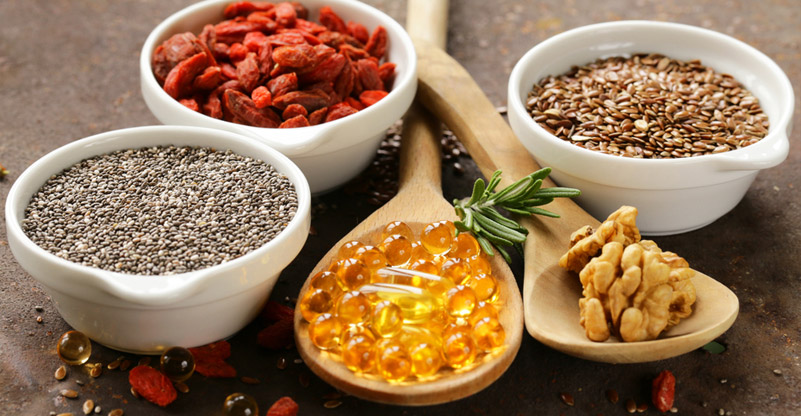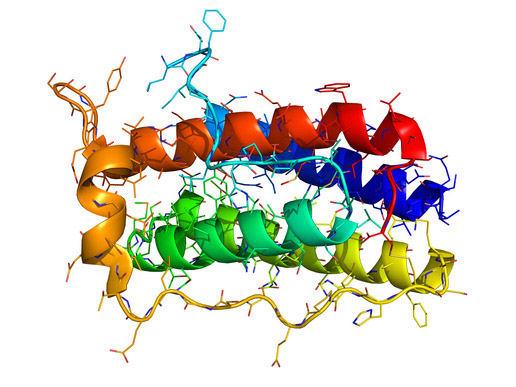Foods that Increase Leptin Sensitivity
Leptin is a protein produced in the adipose tissues (fat cells) of the body. This hormone works directly on the hypothalamus, the area of the brain that is responsible for coordinating some bodily functions, among which are satiety (the feeling of fullness) and appetite. As a result, leptin may override the desire to eat, leading to a reduction in caloric intake. Its primary role is to regulate the number of calories we consume and burn the amount of fat we have in our body. Leptin signals to the brain: “Stop, you’ve eaten enough”. It plays a significant role in weight loss by regulating appetite, metabolism, and behavior . Food has the power to increase or suppress the leptin levels in our body. In the following article, we are going to take a closer look at leptin, it’s specific functions and foods that increase leptin production.
Functions of Leptin
- Regulates fat;
- Sends satiety signal to the brain, i.e., it helps us reduce hunger and food intake;
- Enhances the metabolism of fat and glucose;
- Inhibits the production of hormones and peptides that increase appetite and food cravings;
- Influences not only the food intake by reducing hunger and promoting satiety, but also intervenes in the energy balance by encouraging the burning of fat and spending energy;
- Stimulates the degradation of fatty acids;
Foods That Increase Leptin

Our body cannot consume leptin – it must produce it. Therefore, we must consume foods that increase leptin. The reason our bodies must produce leptin is because our intestines cannot process it. However, you can increase or optimize leptin resistance by consuming certain foods. Supplements and lifestyle can also play a large role. Eating food with low-fat content is important, but it is equally important to choose foods that contain healthy fats since our body needs these fats to function efficiently. The foods that contain healthy fats such as omega 3 are for example:
-
Meat Products
- Beef
- Poultry
- Quail
- Turkey
- Pork
-
Dairy products
- Milk
- Eggs
- Yoghurt
- Cheese
-
Vegetables
- Spinach
- Broccoli
- Cabbage
- Cauliflower
- Kale
-
Grains and Pasta
- Wheat Germ
- Noodles
-
Breakfast Cereals
- Granola
- Special K Low Carb high Protein
- KRETSCHMER Honey Crunch Wheat Germ
- Oatmeal
-
Healthy oils
- Fish oil
- Canola oil
- Flaxseed oil
- Soybean oil
- Virgin olive oil
-
Nuts
- Walnuts
- Peanuts
- Almonds
- Pecans
- Pine nuts
-
Seeds
- Flax Seeds (preferably crushed)
- Sunflower seeds
- Pumpkin seeds
- Alfalfa seeds
- Chia seeds
-
Fish
(Not more than twice per week)
- Tuna
- Salmon
- Mackerel
- Halibut
- Anchovies
-
Spices
- Basil
- Marjoram
- Oregano
- Spearmint
- Mustard
- Thyme
- Bay leaf
- Turmeric
Leptin Resistance and Sensitivity

Leptin – 3D molecular structure
Leptin resistance is a condition in which the brain cannot determine when the level of body fat is adequate. Despite the excessive amount of fat, the brain perceives a state of starvation and orders more fat storage. Also, you feel hungry and continue eating when you don’t need to. Many obese people have defective metabolic systems. If the leptin signal is damaged, they can only rely on a strong self-control.
The key to overcoming resistance to leptin is in reducing inflammation and have a healthy diet to contribute to reducing leptin levels in your body. Fiber is essential for a healthy diet, but for obese people, the fiber is even more important. Foods that are high in dietary fiber make you feel fuller than foods low in fiber. Fiber also reduces cardiovascular risk factors.
How to Increase Leptin Sensitivity
Taking in foods that aid in balancing the leptin levels may help restore sensitivity to this hormone and improve the signals sent to the brain. Eating breakfast rich in protein and fibers helps in restoring the leptin sensitivity in our body. One must try to avoid all empty calories and unhealthy fats .
Another important aspect is the habit of eating small frequent meals rather than a few large meals, throughout the course of the day to speed up your body’s metabolism. These lighter meals must be calorically low and include foods such as low-fat yogurt, fruits, dried fruit, salad, cereals and so on. Fresh fruits and vegetables provide an excellent source of energy and are low-calorie food so you can eat several times a day. These foods can balance leptin levels flowing in the body, thus helping to satisfy the appetite, feeling full, reduce fatigue, increase metabolism and communicate to our brain that we are full of energy.
Important points about leptin
- Leptin level varies depending on your calorie intake;
- It gives your body a sense of satiety;
- It stimulates fat metabolism;
- Training or fasting is favorable to leptin production;
- Carrot, tea, fish, omega-3, and flaxseed are among the foods that maximize the leptin levels in our body;
Weight Loss
The leptin hormone, along with ghrelin and insulin act like thermostat switches while trying to maintain the balance between hunger and fat content in our body. For example, in a heater, the thermostat monitors the level of heat in the room. When the room is too cold, the thermostat turns the heater on and vice versa. Leptin levels operate according to this principle.
- An increase in the leptin levels signals your brain to burn fat by speeding up the body’s metabolism. The brain acts as the thermostat, by turning off the fat storage mechanism.
- When the leptin levels drop too low, the brain turns on fat storage again. In a healthy person, leptin levels determine how hungry you are, and how much fat your body is going to store.
Summing Things Up
Leptin is a protein produced by the body in our blood that determines appetite and metabolism. The concentration of leptin in the blood of each person is not the same and depends directly on the number and size of adipocytes (fat cells) present in the body. We could say that leptin is a kind of regulator of our body, which functions as an alarm to maintain the ideal weight depending on our body type.
- The hormone is manufactured by the adipose tissue (fat cells) of the body. Thus, if you have more fat, the more leptin you produce.
- Leptin is carried to the brain through the bloodstream, where it signals the hypothalamus. The hypothalamus is that area of our brain which controls the feeling of hunger and starvation.
- Fat cells use leptin to communicate with the brain. For example, a significant amount of leptin levels in the body signals the brain that we have a lot of stored fat while low levels of leptin mean that fat stores are low, and we are at a risk of food shortage, thus promoting hunger.
In short, the primary function of leptin is to send a signal to the brain to “tell” how much fat becomes stored in the fat cells of the body. As mentioned above one cannot consume leptin. Therefore, foods high in leptin don’t necessarily exist. The key is to increase the consumption foods high in Omega 3 that aid in reducing inflammation in our bodies and assist our bodies in producing leptin.


